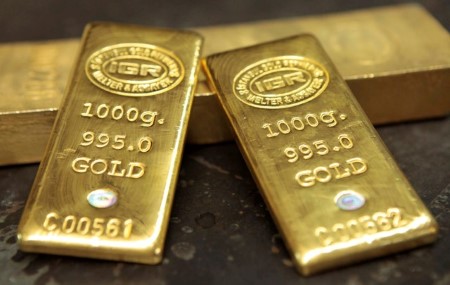




Policy Rate Updates: BSP outlook — cloudy with a chance of rate cut
 DOWNLOAD
DOWNLOAD

January Economic Update: Growth slows, prices rise
 DOWNLOAD
DOWNLOAD

Inflation Update: Up, up, and away?
 DOWNLOAD
DOWNLOAD


Gold retreats as dimming rate cut expectations overshadow safe haven demand

April 17 – Gold prices edged down on Wednesday, but traded near their record high levels hit last week, as pressure from fading US rate cut hopes overshadowed gains from safe haven demand arising out of geopolitical turmoil in the Middle East.
Spot gold eased 0.2% to USD 2,376.39 per ounce, as of 2:15 p.m. ET (1815 GMT). Prices hit an all-time high of USD 2,431.29 on Friday.
US gold futures settled 0.8% lower at USD 2,388.4.
“Geopolitical uncertainty continues to support gold and if there is any escalation in the situation, then prices could move towards the USD 2,500 range,” said Phillip Streible, chief market strategist at Blue Line Futures in Chicago.
“Gold prices will only come lower if central banks stop buying or if investors go back to a risk-on phase,” he said.
Iran said its military was ready to confront any attack by Israel. Iran carried out its first-ever direct attack on Israel last weekend in retaliation for a suspected Israeli strike on an Iranian diplomatic compound in Damascus on April 1.
Top US central bank officials including Federal Reserve Chair Jerome Powell backed away on Tuesday from providing any guidance on when interest rates may be cut, saying instead that monetary policy needs to be restrictive for longer.
The market is pricing in a 71% chance of a US rate cut by September. Higher interest rates reduce the appeal of holding non-yielding gold.
While gold has largely remained uncorrelated with the US dollar and Treasury yields in the current trend, it may still show short-term responses to movements in both, said FXTM senior research analyst Lukman Otunuga.
Spot silver rose 1.1% to USD 28.39.
The global silver deficit is expected to rise by 17% to 215.3 million troy ounces in 2024 due to a 2% growth in demand led by robust industrial consumption and a 1% fall in total supply, the Silver Institute said.
Spot platinum fell 1.5% to USD 942.79 and palladium rose 1.4% at USD 1,027.56.
(Reporting by Ashitha Shivaprasad, Harshit Verma, and Anjana Anil in Bengaluru; Editing by Vijay Kishore and Shailesh Kuber)
This article originally appeared on reuters.com





 By Reuters
By Reuters